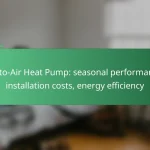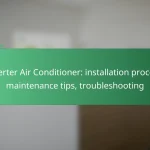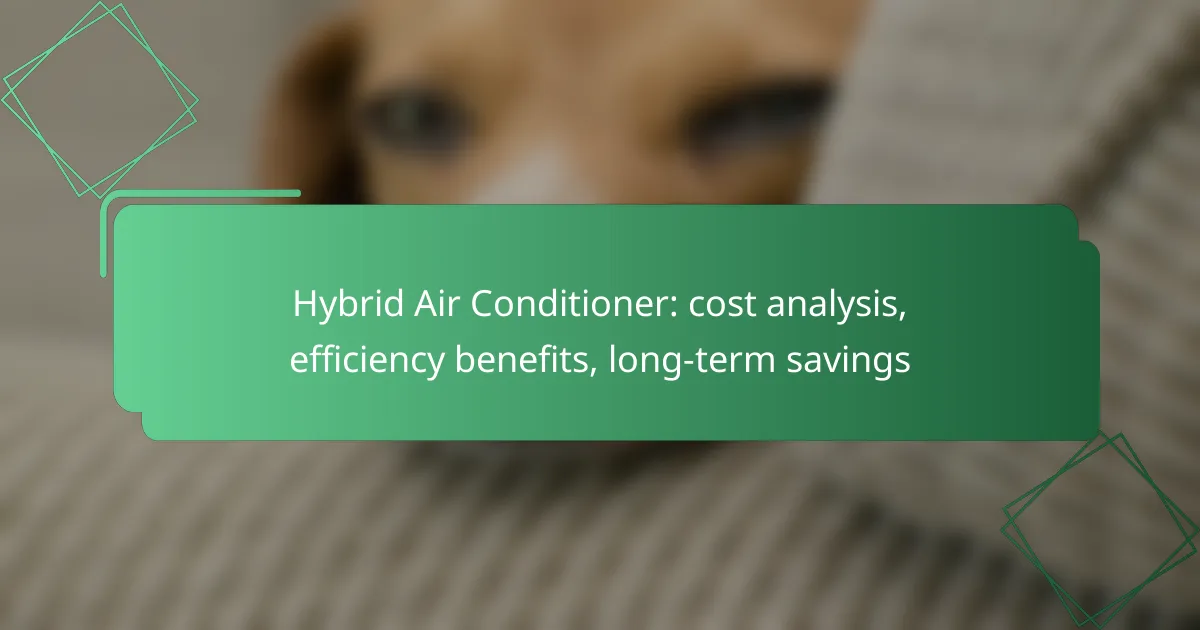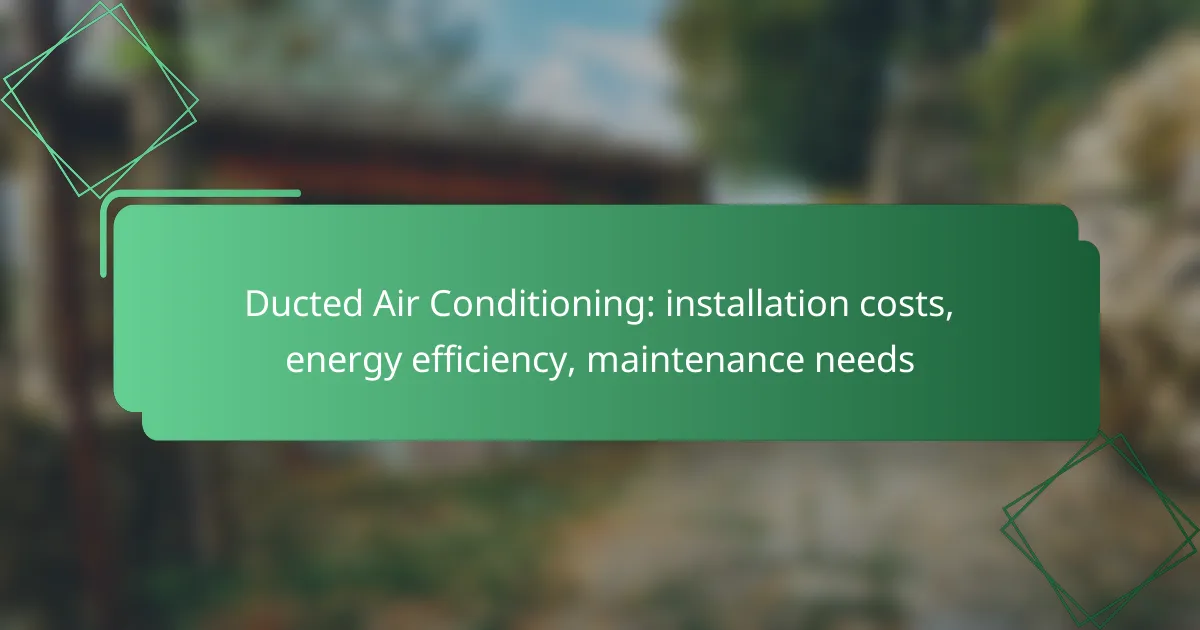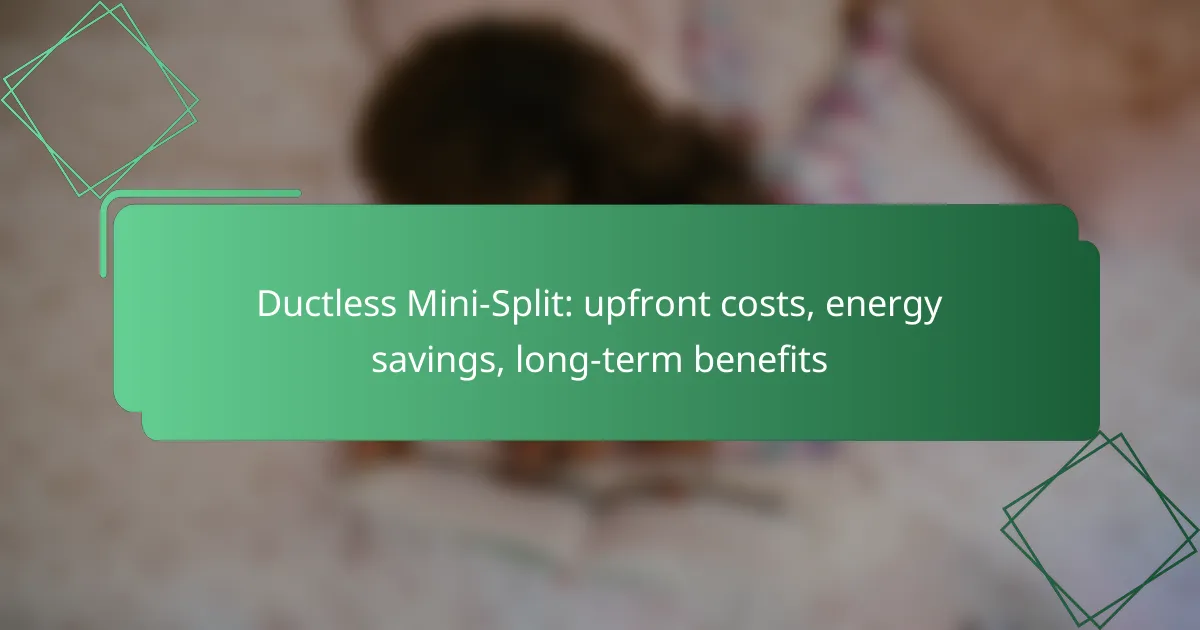Hybrid air conditioners represent a smart investment for homeowners looking to enhance energy efficiency and reduce long-term costs. By combining multiple energy sources, these systems optimize performance and lower utility bills, making them a cost-effective choice. Understanding the initial purchase, installation, and maintenance expenses, along with potential government incentives, is crucial for maximizing savings and benefits.
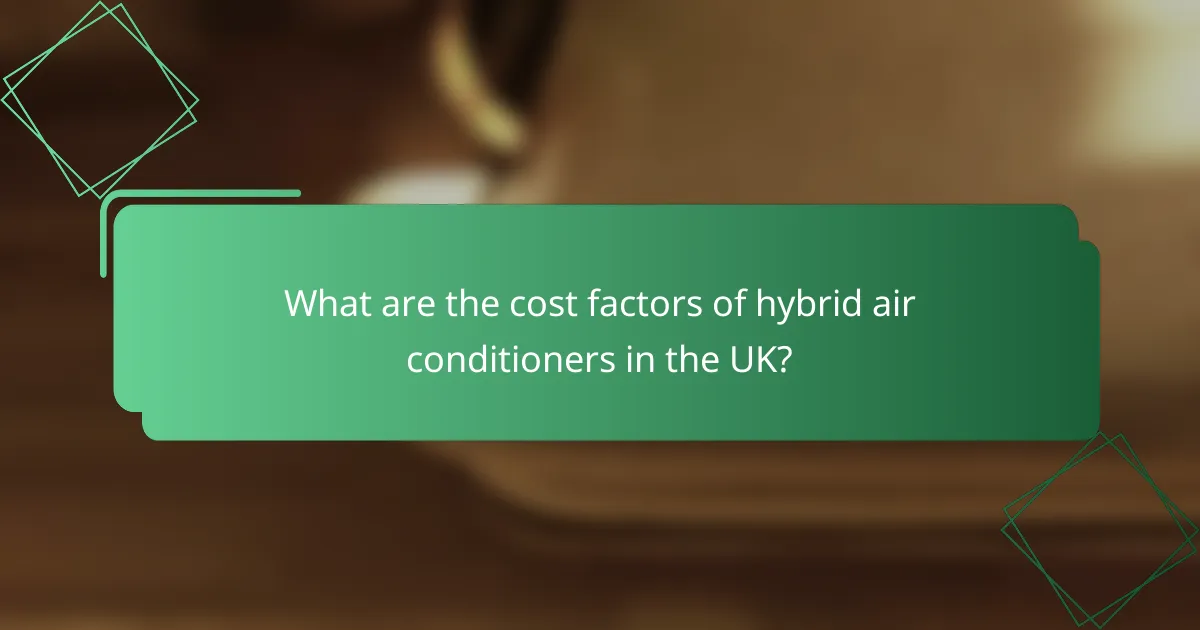
What are the cost factors of hybrid air conditioners in the UK?
The cost factors of hybrid air conditioners in the UK include the initial purchase price, installation costs, maintenance expenses, energy consumption rates, and available government incentives. Understanding these elements can help homeowners make informed decisions about their investment in hybrid cooling systems.
Initial purchase price
The initial purchase price of a hybrid air conditioner typically ranges from £1,500 to £3,500, depending on the brand, model, and features. Higher-end models may offer advanced technology and better efficiency, which can justify the higher cost. It’s essential to compare different options to find a unit that fits your budget and cooling needs.
Installation costs
Installation costs for hybrid air conditioners can vary significantly, usually falling between £500 and £1,500. Factors influencing installation expenses include the complexity of the setup, existing ductwork, and the need for additional components. Hiring a qualified technician is crucial to ensure proper installation and optimal performance.
Maintenance expenses
Maintenance expenses for hybrid air conditioners generally range from £100 to £300 annually. Regular servicing is essential to keep the system running efficiently and to prevent costly repairs. Homeowners should schedule annual check-ups and be proactive about replacing filters and cleaning components to extend the lifespan of their unit.
Energy consumption rates
Hybrid air conditioners are designed to be energy-efficient, often using less electricity than traditional systems. The energy consumption rates can vary, but many units achieve efficiency ratings of SEER 15 or higher. This efficiency translates into lower monthly energy bills, making hybrid systems a cost-effective choice over time.
Government incentives
The UK government offers various incentives for homeowners who invest in energy-efficient appliances, including hybrid air conditioners. These may include grants, tax credits, or rebates that can significantly reduce the overall cost. Homeowners should check local regulations and available programs to maximize their savings when purchasing a hybrid system.
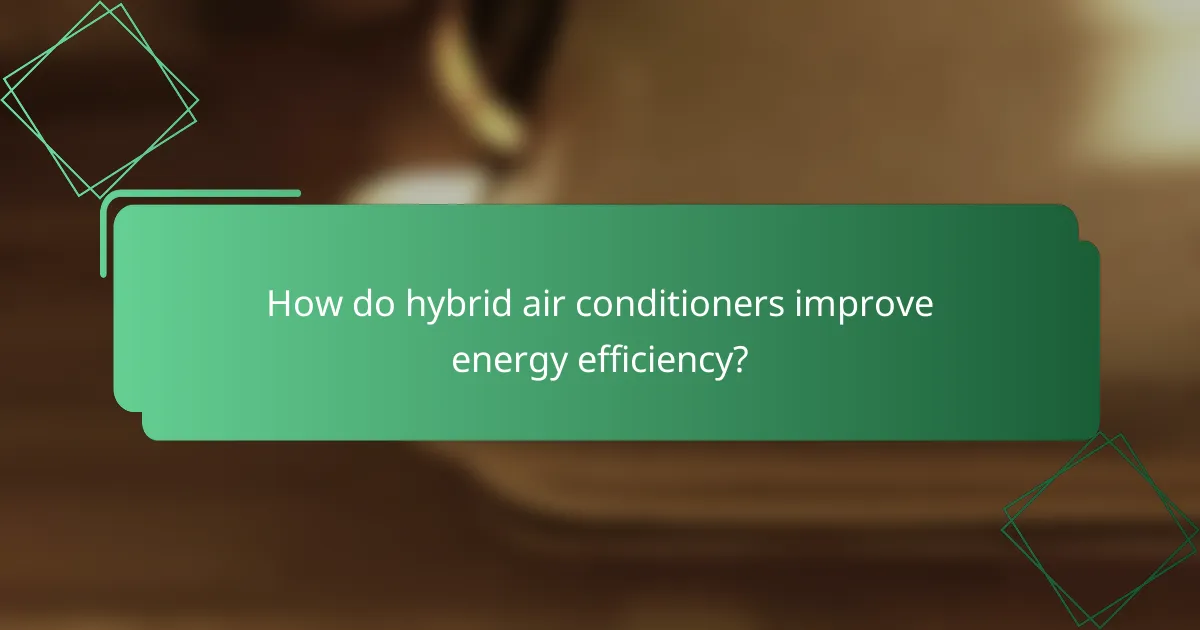
How do hybrid air conditioners improve energy efficiency?
Hybrid air conditioners enhance energy efficiency by combining multiple energy sources, typically electricity and gas, to optimize performance. This dual approach allows for better energy management, reducing overall consumption and lowering utility bills.
Dual energy source utilization
Hybrid air conditioners utilize both electric and gas energy sources, allowing them to switch between the two based on efficiency needs. During milder weather, the system can operate on electricity, which is often cheaper, while switching to gas during peak demand or extreme temperatures for better heating performance.
This flexibility can lead to significant cost savings, especially in regions where electricity prices fluctuate seasonally. Homeowners can expect to see reductions in their monthly energy bills by leveraging the most cost-effective energy source available at any given time.
Smart technology integration
Many hybrid air conditioners come equipped with smart technology that optimizes energy use based on real-time data. These systems can learn user preferences and adjust settings automatically, ensuring maximum comfort without excessive energy consumption.
Smart thermostats and mobile apps allow homeowners to monitor and control their systems remotely, enabling them to adjust settings when away from home. This capability can further enhance energy savings by preventing unnecessary heating or cooling when the house is unoccupied.
Variable speed operation
Variable speed operation is a key feature of hybrid air conditioners that allows the system to adjust its cooling or heating output based on current demand. Unlike traditional units that operate at a fixed speed, variable speed systems can run at lower speeds for longer periods, maintaining consistent temperatures while using less energy.
This efficiency not only reduces energy consumption but also minimizes wear and tear on the system, leading to longer lifespan and lower maintenance costs. Homeowners can benefit from improved comfort levels and significant long-term savings on energy bills.
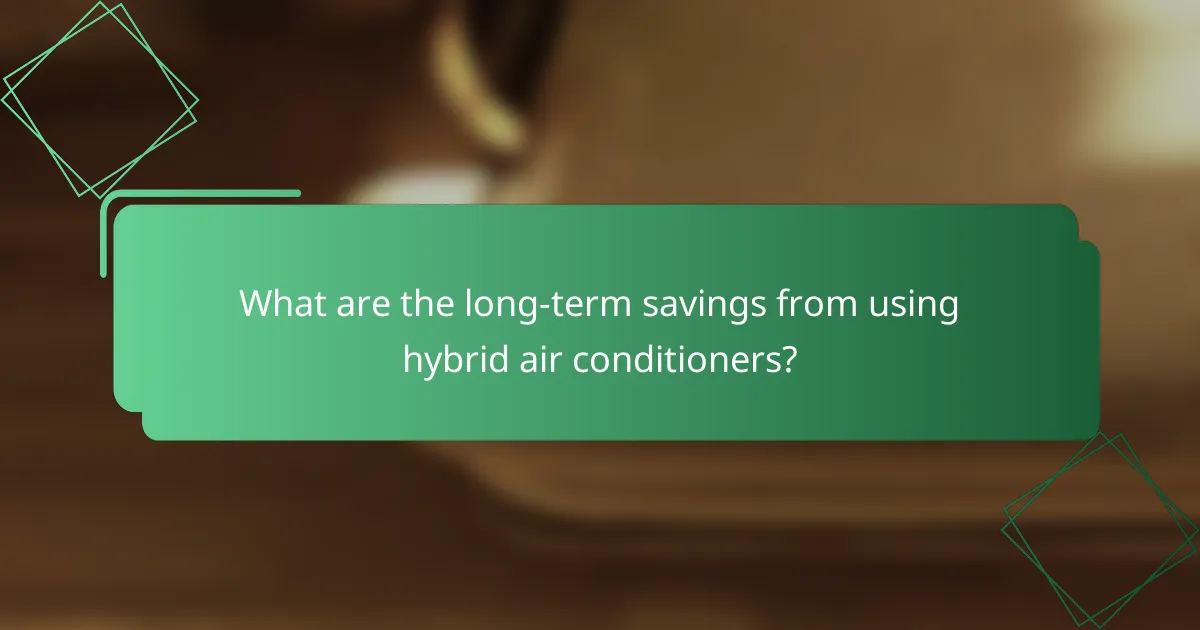
What are the long-term savings from using hybrid air conditioners?
Hybrid air conditioners can lead to significant long-term savings through reduced energy costs, lower environmental impact, and increased property value. By leveraging both traditional and renewable energy sources, these systems optimize efficiency and minimize expenses over time.
Reduced energy bills
One of the primary benefits of hybrid air conditioners is their ability to lower energy bills. By switching between electricity and alternative energy sources, such as solar power, these systems can operate more efficiently, especially during peak demand periods. Homeowners may see energy savings ranging from 20% to 50% compared to conventional systems.
To maximize savings, consider using a programmable thermostat that adjusts settings based on occupancy and time of day. Regular maintenance, such as cleaning filters and checking refrigerant levels, also helps maintain efficiency and further reduce costs.
Lower carbon footprint
Hybrid air conditioners contribute to a lower carbon footprint by utilizing renewable energy sources, which reduces reliance on fossil fuels. This shift not only decreases greenhouse gas emissions but also aligns with many local regulations aimed at promoting sustainable energy practices.
For example, in regions with strong solar incentives, homeowners can significantly cut their carbon emissions by integrating solar panels with their hybrid systems. This not only benefits the environment but may also qualify homeowners for tax credits or rebates, enhancing overall savings.
Increased property value
Investing in a hybrid air conditioner can increase property value due to its energy efficiency and eco-friendly features. Potential buyers often prioritize homes with modern, efficient HVAC systems, which can lead to higher resale prices. Studies suggest that energy-efficient upgrades can yield returns of 70% to 80% on investment.
When selling a home, highlight the hybrid system’s benefits, such as lower utility bills and reduced environmental impact. Providing documentation of energy savings and any relevant certifications can further attract buyers and justify a higher asking price.
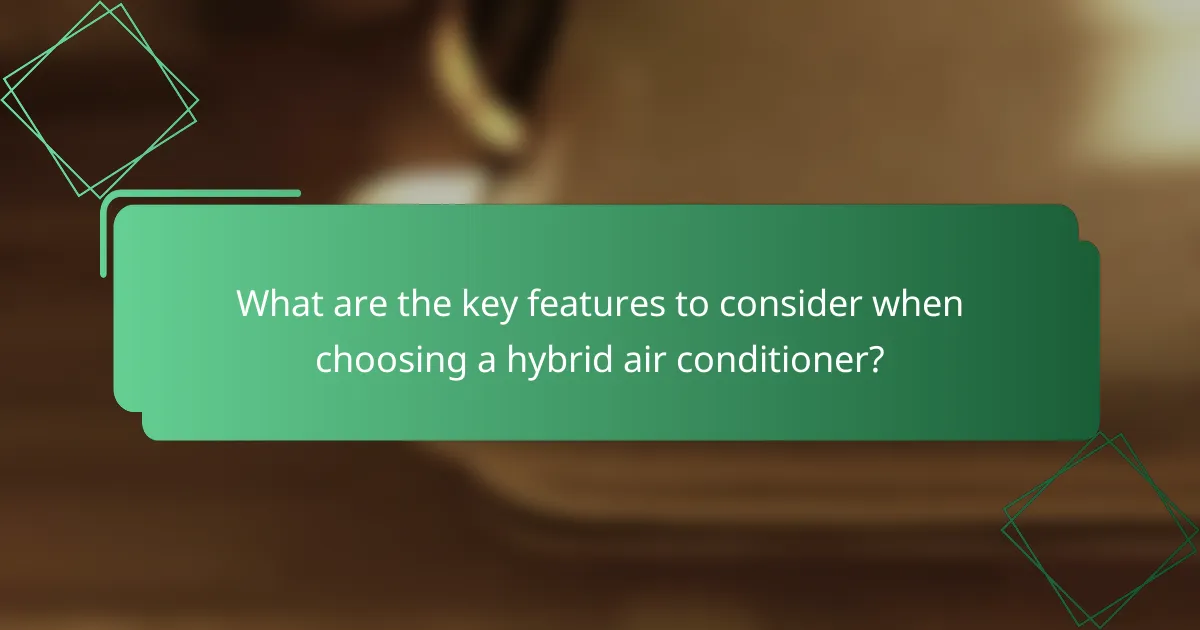
What are the key features to consider when choosing a hybrid air conditioner?
When selecting a hybrid air conditioner, focus on its cooling capacity, energy efficiency ratings, noise levels, and brand reliability. These features significantly impact performance, cost-effectiveness, and user satisfaction over time.
Cooling capacity
Cooling capacity, measured in British Thermal Units (BTUs), indicates how effectively an air conditioner can cool a space. For residential units, capacities typically range from about 5,000 to 30,000 BTUs, depending on the size of the area to be cooled.
To determine the right capacity for your needs, consider the square footage of the room, ceiling height, and insulation quality. A unit with too low a capacity will struggle to cool effectively, while one that is too powerful may lead to higher energy costs and humidity issues.
Energy efficiency ratings
Energy efficiency ratings, such as the Seasonal Energy Efficiency Ratio (SEER) and Energy Efficiency Ratio (EER), help gauge how much cooling you get for each unit of energy consumed. Look for units with a SEER rating of at least 14, as these are generally considered efficient.
Higher efficiency ratings can lead to significant savings on energy bills over time. For example, a unit with a SEER of 20 can save you up to 30% on cooling costs compared to a unit with a SEER of 14.
Noise levels
Noise levels are crucial for comfort, especially in bedrooms or quiet spaces. Most hybrid air conditioners operate within a range of 50 to 70 decibels, with lower levels being preferable for residential use.
When evaluating noise, check the manufacturer’s specifications and consider models with variable speed compressors, which tend to operate more quietly than traditional units. This can enhance your overall comfort while using the air conditioner.
Brand reliability
Brand reliability is essential when investing in a hybrid air conditioner, as it often correlates with product longevity and customer service. Research brands known for their durability and positive customer feedback.
Look for warranties that cover parts and labor for several years, as this can indicate the manufacturer’s confidence in their product. Brands with strong reputations often provide better support and service, ensuring peace of mind for your investment.
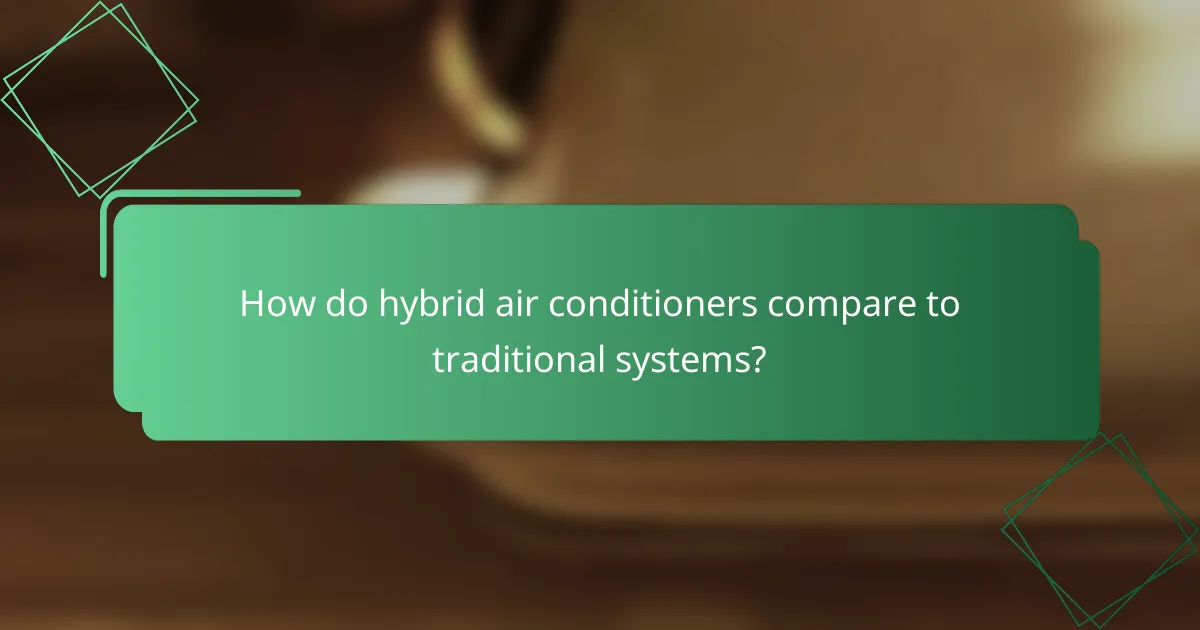
How do hybrid air conditioners compare to traditional systems?
Hybrid air conditioners offer a blend of energy efficiency and cost savings compared to traditional systems. By utilizing both electric and gas power, they can optimize energy use based on current conditions, leading to lower operational costs and reduced environmental impact.
Cost efficiency
Hybrid air conditioners can significantly reduce energy bills, especially in regions with fluctuating energy prices. By switching between electric and gas power, these systems can operate more efficiently, often resulting in savings of 20-50% on cooling costs compared to conventional units.
When considering installation costs, hybrid systems may have a higher upfront investment, typically ranging from $3,000 to $7,000. However, the long-term savings on energy bills can offset this initial expense within a few years, making them a financially sound choice for many homeowners.
Environmental impact
Hybrid air conditioners are generally more environmentally friendly than traditional systems. By utilizing gas when it is more efficient, they can lower greenhouse gas emissions and reduce reliance on electricity generated from fossil fuels.
In addition, many hybrid systems are designed to meet or exceed energy efficiency standards, such as the ENERGY STAR certification. This not only helps in reducing the carbon footprint but can also qualify homeowners for local rebates or incentives aimed at promoting energy-efficient appliances.


